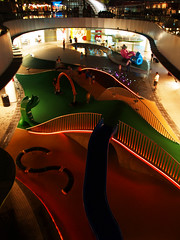recalling on sounds

playground at the mall - image by J
Last week, J and I finally made our way across the monster mall Vivocity to reach this bookstore, designed by the same architect for the Kinokuniya and the very first PageOne at Marina Square. Like the PageOne at taipei 101, entering this bookstore is like entering a forest (well, paper is from trees). Its slanting shelves of unequal height, overhead shelves and displays, crooked paths, uneven floor heights and hidden nooks where you could pause, sit and read - these give the store a labyrinthian quality. But PageOne is especially lovely because, for those who read Chinese at least, the Chinese titles are shelved alongside the English ones.
And in this way I chanced upon this book: <形象追憶> (Recalling on Image) by 杨卫 (Yang Wei), published by 宋莊 (the artist village to the more Soho-esque 798 galleries).
 For a long time to me, Chinese contemporary art = Revolutionaries and a Prada logo + identical grinning men + bright green dogs = anachronistic pop art = trendy/sexy = big money = happiness for auction houses Christie's and Soethby's = another sign of China's renewed ascendancy.
For a long time to me, Chinese contemporary art = Revolutionaries and a Prada logo + identical grinning men + bright green dogs = anachronistic pop art = trendy/sexy = big money = happiness for auction houses Christie's and Soethby's = another sign of China's renewed ascendancy.But reading Yang Wei's reflections on the artists he knew at Song Zhuang and 圓明園 (Yuan Ming Yuan, another artist village) made me envious of their ability to relate to a history, to dialogue with a coherent past, hence chart a clear trajectory - for the individual, and later retrospectively, of a millieu. There is therefore a meaningful visual language to interpret, reshape, and even trade.
I have no such luck with language. Especially as I read these essays on art, what my eye sees my mind sometimes does not register! (Yes, so much for the bilingual policy). I have better luck when I read the essays out loud; as if the sounds of the words or their approximations would trigger another skein of memory, recalling those dubbed TV dramas, snatches of mandarin pop songs and even more vaguely, those radio plays on redifusion some sleepy afternoons.



Comments
maybe the polarity of curse and blessing is stupid and wrong in the first place?
this is the best that i, citizen of this uncountrylike-country with its not-long-enough-past and always-something-else future, can come up with, at the present.